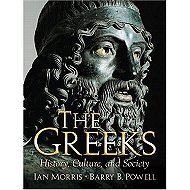|
The Greeks: History, Culture, and Society
|
|
Ian Morris, Barry B. Powell
|

|

From the Preface
In this book we try to see ancient Greece as a whole: not just provide a narrative of events or an overview of culture, but history and culture taken together. From ancient Greece comes the modern conviction that through open discussion and the exercise of reason, a society of free citizens can solve the problems that challenge it. In one period of Greek history, a society just so governed produced timeless masterpieces of literature, art, and rational thought at the same time it waged terrible wars and countless other cruelties…
We have organized the material chronologically in a continuous narrative, beginning at the end of the last Ice Age. We take the story through the palaces of Mycenaean Greece and the depressed centuries of the Dark Age to the birth of city-states in the Archaic Period. We describe the triumphs of the city-states in the Classical Period and their subjection to larger kingdoms in the Hellenistic Period… and finally, their conquest by Rome. As we tell the story, we describe processes of social change and cultural achievements along with political events…
Our account differs in significant ways from the many excellent overviews of Greek History that already exist.
First, we make special efforts to see the Greeks as part of a larger Mediterranean world… We try to show how thoroughly linked developments were in eastern and western Greece. Most previous accounts also present non-Greek people like the Persians and the Carthaginians…, only to defeat or be defeated. We try to make clear their motivations and their contributions to the larger story…
Second, we have rejected the prejudice that the only things worth knowing about Greece ended with the Peloponnesian War in 404 B.C., the death of Socrates in 399 B.C., or the battle of Chaeronea in 338 B.C. The final three centuries B.C. are vitally important in the story of the Greeks…
Third, because so much of antiquity is apprehended through the eye, we include abundant maps and photographs of landscapes, objects, and buildings. Archeologists' discoveries have changed the ways we understand ancient Greece, and we emphasize material culture throughout.
|
|
